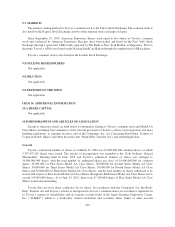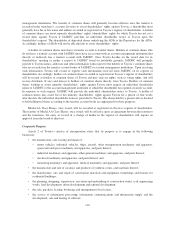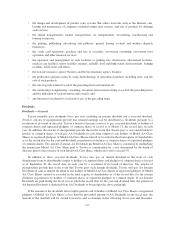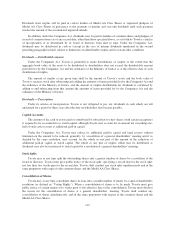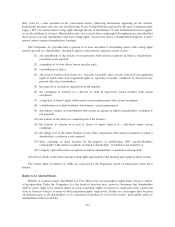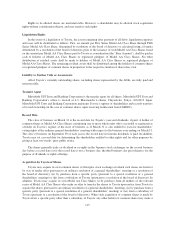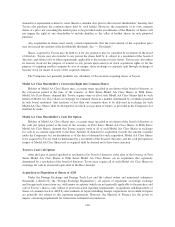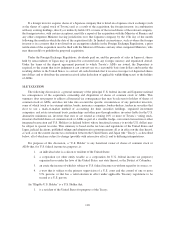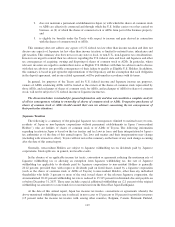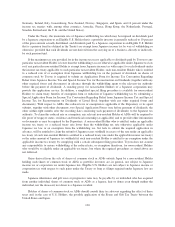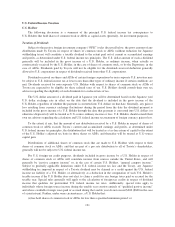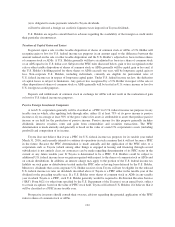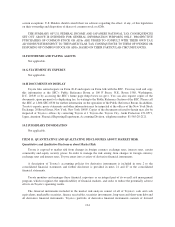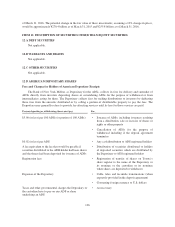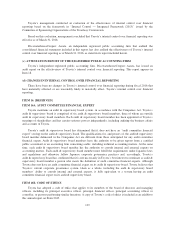Toyota 2015 Annual Report Download - page 124
Download and view the complete annual report
Please find page 124 of the 2015 Toyota annual report below. You can navigate through the pages in the report by either clicking on the pages listed below, or by using the keyword search tool below to find specific information within the annual report.2. does not maintain a permanent establishment in Japan (a) with which the shares of common stock
or ADSs are effectively connected and through which the U.S. holder carries on or has carried on
business, or (b) of which the shares of common stock or ADSs form part of the business property;
and
3. is eligible for benefits under the Treaty with respect to income and gain derived in connection
with the shares of common stock or ADSs.
This summary does not address any aspects of U.S. federal tax law other than income taxation and does not
discuss any aspects of Japanese tax law other than income taxation, as limited to national taxes, inheritance and
gift taxation. This summary also does not cover any state or local, or non-U.S., non-Japanese tax considerations.
Investors are urged to consult their tax advisors regarding the U.S. federal, state and local and Japanese and other
tax consequences of acquiring, owning and disposing of shares of common stock or ADSs. In particular, where
relevant, investors are urged to confirm their status as Eligible U.S. Holders with their tax advisors and to discuss
with their tax advisors any possible consequences of their failure to qualify as Eligible U.S. Holders. In addition,
this summary is based in part upon the representations of the Depositary and the assumption that each obligation
in the deposit agreement, and in any related agreement, will be performed in accordance with its terms.
In general, for purposes of the Treaty and for U.S. federal income and Japanese income tax purposes,
owners of ADRs evidencing ADSs will be treated as the owners of the shares of common stock represented by
those ADSs, and exchanges of shares of common stock for ADSs, and exchanges of ADSs for shares of common
stock, will not be subject to U.S. federal income or Japanese income tax.
The discussion below is intended for general information only and does not constitute a complete analysis
of all tax consequences relating to ownership of shares of common stock or ADSs. Prospective purchasers of
shares of common stock or ADSs should consult their own tax advisors concerning the tax consequences of
their particular situations.
Japanese Taxation
The following is a summary of the principal Japanese tax consequences (limited to national taxes) to non-
residents of Japan or non-Japanese corporations without permanent establishments in Japan (“non-resident
Holders”) who are holders of shares of common stock or of ADSs of Toyota. The following information
regarding taxation in Japan is based on the tax treaties and tax laws in force and their interpretation by Japan’s
tax authorities as of the date of this annual report. Tax laws and treaties and their interpretations may change
(including with retroactive effect). Toyota will not revise this summary on the basis of any such change occurring
after the date of this annual report.
Generally, non-resident Holders are subject to Japanese withholding tax on dividends paid by Japanese
corporations. Stock splits are, in general, not taxable events.
In the absence of an applicable income tax treaty, convention or agreement reducing the maximum rate of
Japanese withholding tax or allowing an exemption from Japanese withholding tax, the rate of Japanese
withholding tax applicable to dividends paid by Japanese corporations to non-resident Holders is generally
20.42 percent, provided that, with respect to dividends paid on listed shares issued by a Japanese corporation
(such as the shares of common stock or ADSs of Toyota) to non-resident Holders, other than any individual
shareholder who holds 3 percent or more of the total issued shares of the relevant Japanese corporation, the
aforementioned 20.42 percent withholding tax rate is reduced to 15.315 percent for dividends due and payable on
or before December 31, 2037. These rates include a special additional withholding tax (2.1 percent of the original
withholding tax amount) to secure funds for reconstruction from the Great East Japan Earthquake.
At the date of this annual report, Japan has income tax treaties, conventions or agreements whereby the
above-mentioned withholding tax rate is reduced, in most cases to 15 percent or 10 percent for portfolio investors
(15 percent under the income tax treaties with, among other countries, Belgium, Canada, Denmark, Finland,
119


